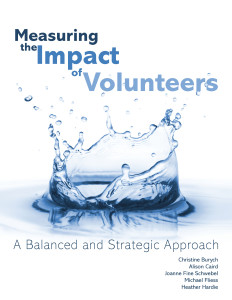Want to make me cranky? Suggest that the best way to measure volunteer engagement is to count how many volunteers have been involved in a set period, how many hours they’ve given, and a monetary value for those hours. Such thinking manifests itself in statements like this, taken from a nonprofit in Oregon:
Volunteers play a huge role in everything we do. In 2010, 870 volunteers contributed 10,824 hours of service, the equivalent of 5.5 additional full-time employees!
Yes, that’s right: this nonprofit is proud to say that volunteer engagement allowed this organization to keep 5.5 people from being employed!
Another cringe-worthy statement about the value of volunteers – yes, someone really said this, although I’ve edited a few words to hide their identity:
[[Organization-name-redacted]] volunteers in [[name-of-city redacted]] put in $700,000 worth of free man hours last year… It means each of its 7,000 volunteers here contributed about $100 – the amount their time would have been worth had they been paid.
I have a web page talking about the dire consequences of this kind of thinking, as well as a range of blogs, listed at the end of this one. That same web page talks about much better ways to talk about the value of volunteers – but it really takes more than a web page to explain how an organization can measure the true value of volunteers.
 That’s why I was very happy to get an alert from Energize, Inc. about a new book, Measuring the Impact of Volunteers: A Balanced and Strategic Approach, by ChristineBurych, Alison Caird, Joanne Fine Schwebel, Michael Fliess and Heather Hardie. This book is an in-depth planning tool, evaluation tool and reporting tool. How refreshing to see volunteer value talked about in-depth – not just as an add-on to yet another book on volunteer management. But the book’s importance goes even further: the book will not only be helpful to the person responsible for volunteer engagement at an organization; the book will also push senior management to look at volunteer engagement as much, much more than “free labor” (which it isn’t, of course). Marketing managers need to read this book. The Executive Director needs to read this book. Program managers need to read this book. The book is yet another justification for thinking of the person responsible for the volunteer engagement program at any agency as a volunteerism specialist – a person that needs ongoing training and support (including MONEY) to do her (or his) job. This book shows why the position – whether it’s called volunteer manager, community engagement director, coordinator of volunteers, whatever – is essential, not just nice, and why that person needs to be at the senior management table.
That’s why I was very happy to get an alert from Energize, Inc. about a new book, Measuring the Impact of Volunteers: A Balanced and Strategic Approach, by ChristineBurych, Alison Caird, Joanne Fine Schwebel, Michael Fliess and Heather Hardie. This book is an in-depth planning tool, evaluation tool and reporting tool. How refreshing to see volunteer value talked about in-depth – not just as an add-on to yet another book on volunteer management. But the book’s importance goes even further: the book will not only be helpful to the person responsible for volunteer engagement at an organization; the book will also push senior management to look at volunteer engagement as much, much more than “free labor” (which it isn’t, of course). Marketing managers need to read this book. The Executive Director needs to read this book. Program managers need to read this book. The book is yet another justification for thinking of the person responsible for the volunteer engagement program at any agency as a volunteerism specialist – a person that needs ongoing training and support (including MONEY) to do her (or his) job. This book shows why the position – whether it’s called volunteer manager, community engagement director, coordinator of volunteers, whatever – is essential, not just nice, and why that person needs to be at the senior management table.
I really hope this book will also push the Independent Sector, the United Nations, other organizations and other consultants to, at last, abandon their push of a dollar value as the best measurement of volunteer engagement.
For more on the subject of the value of volunteer or community engagement, here are my blogs on the subject (yeah, it’s a big deal with me):
- Make volunteering transformative, not about # of hours
- OPB & Congress Think Volunteers are Free
- Valuing volunteer engagement: an imaginary case study
- Contradicting myself? (about HistoriCorps and volunteers in California state parks)
- We need volunteer police officers – & an overhaul as well
- Volunteering empowers, activates, builds, communicates
- Volunteer engagement is MUCH more than just HR management
- CNCS continues its old-fashioned measurement of volunteer value
- UN Volunteers, IFRC, ILO & others make HUGE misstep
- UN Agencies: Defend your “internships”
- Fight against unpaid internships will hurt volunteering
- Advice for unpaid interns to sue for back pay
- It’s real: the unpaid internships & volunteers controversy
- Judging volunteers by their # of hours? No thanks.
- EU agencies exploiting interns?
- When to NOT pay interns, redux
- Pizzeria tries to recruit unpaid interns, feels Internet’s wrath
- Do NOT say “Need to Cut Costs? Involve Volunteers!”
- Value of Volunteers – Still Beating the Drum
- Another anti-volunteer union
- Criticism Continues for UK Government Talk Re Volunteers
- International Association of Fire Fighters is anti-volunteer
- Volunteers are suing
- I agree with this anti-crowdsource campaign
